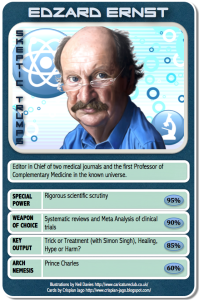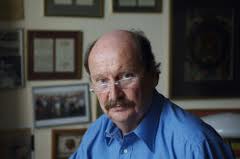By Edzard Ernst
 Some time ago, Andy Lewis formulated a notion which he called ‘Ernst’s law’. Initially, I felt this was a bit o.t.t., then it made me chuckle, and eventually it got me thinking: could there be some truth in it, and if so, why?
Some time ago, Andy Lewis formulated a notion which he called ‘Ernst’s law’. Initially, I felt this was a bit o.t.t., then it made me chuckle, and eventually it got me thinking: could there be some truth in it, and if so, why?
The ‘law’ stipulates that, if a scientist investigating alternative medicine is much liked by the majority of enthusiasts in this field, the scientist is not doing his/her job properly. In any other area of healthcare, such a ‘law’ would be absurd. Why then does it seem to make sense, at least to some degree, in alternative medicine? The differences between any area of conventional and alternative medicine are diverse and profound.
Take neurology, for instance: here we have an organ-system, anatomy, physiology, pathophysiology, etiology and nosology all related more or less specifically to this field and all based on facts, rigorous science and substantial evidence. None of this knowledge, science and evidence is static, but each has evolved and can be predicted to do so in future. What we knew about neurology 50 years ago, for example, was dramatically different from what we know today. Scientific discovery discoveries in neurology link up with the knowledge gathered in other areas of medicine to generate a (more or less) complete bigger picture.
In alternative medicine or any single branch thereof, we have no specific organ-system, anatomy, physiology, pathophysiology, etiology or nosology to speak of. We also have few notions that are transferable from one branch of alternative medicine to another – on the contrary, the assumptions of homeopathy, for example, are in overt contradiction to those of acupuncture which, in turn, are out of sync with those of reflexology, aromatherapy and Reiki.
Instead, each branch of alternative medicine has its own axioms that are largely detached from reality or, indeed, from the axioms of other branches of alternative medicine. In acupuncture, for instance, we have concepts such as yin and yang, qi, meridians and acupuncture points, and there is hardly any development of these concepts. This renders them akin to dogmas, and there is no chance in hell that the combination of all the branches of alternative medicine would add up to provide a sensible ‘bigger picture’.
If a scientist were to instill scientific, critical, progressive thought in a field like neurology, thus overthrowing current concepts and assumptions, they would be greeted with open arms among many like-minded researchers who all pursue the aim of advancing their field and contributing to the knowledge base by overturning wrong assumptions and discovering new truths. If researchers were to spend their time trying to analyse the concepts or treatments of alternative medicine, thus overthrowing current concepts and assumptions, they would not only not be appreciated by the majority of the experts working in this field, they would be castigated for their actions.
If a scientist dedicated decades of hard work to the rigorous assessment of alternative medicine, that person would become a thorn in the flesh of believers. Instead of welcoming him with open arms, some disappointed enthusiasts of alternative treatments might even pay for defaming them.
On the other hand, if a researcher merely misused the tools of science to confirm the implausible assumptions of alternative medicine, he would quickly become the celebrated ‘heroes’ of this field.
This is the bizarre phenomenon that ‘Ernst’s law’ seems to capture quite well – and this is why I believe the ‘law’ is worth more than a laugh and a chuckle. In fact, ‘Ernst’s law’ might even describe the depressing reality of retrograde thinking in alternative medicine more accurately than most of us care to admit.
What do readers feel? Their comments following this blog may well confirm or refute my theory.
_________________________________________________________________________________________
Edzard Ernst MD, PhD, FMedSci, FSB, FRCP, FRCPEd
Emeritus Professor, Exeter University
 Dr. Ernst qualified as a physician in Germany in 1978 where he also completed his MD and PhD theses. He received hands-on training in acupuncture, autogenic training, herbalism, homoeopathy, massage therapy and spinal manipulation.
Dr. Ernst qualified as a physician in Germany in 1978 where he also completed his MD and PhD theses. He received hands-on training in acupuncture, autogenic training, herbalism, homoeopathy, massage therapy and spinal manipulation.
Later, he became Professor in Physical Medicine and Rehabilitation (PMR) at Hannover Medical School and Head of the PMR Department at the University of Vienna. In 1993, he moved to the UK and became Chair in Complementary Medicine at the University of Exeter. He is founder/Editor-in-Chief of two medical journals (Perfusion and Focus on Alternative and Complementary Therapies).
He has published 48 books and more than 1000 articles in the peer-reviewed medical literature. His work has been awarded with 14 scientific prizes. In 1999, he took British nationality.
His research focussed on the critical evaluation of all aspects of alternative medicine. Unlike most of his colleagues, he does not aim to promote a particular therapy. His goal is to provide objective evidence and reliable information. It is fair to say that this ambition did not endear him to many quasi-religious believers in alternative medicine.
Healthy Skepticism is republishing selections from Dr. Ernst’s blog with permission. Please visit his website at http://edzardernst.com
